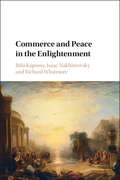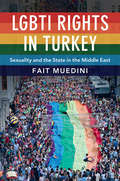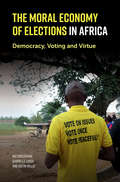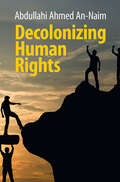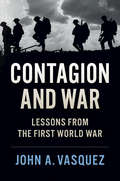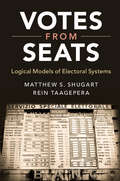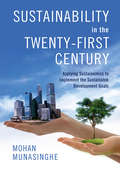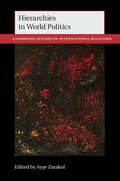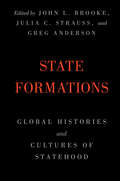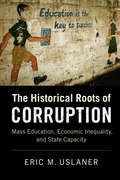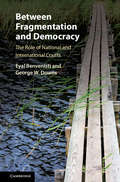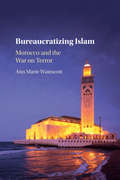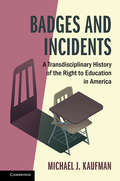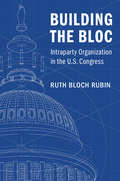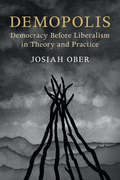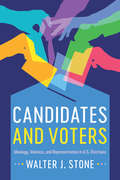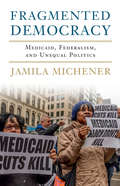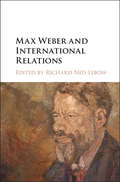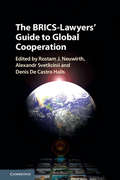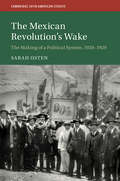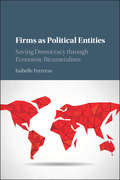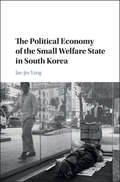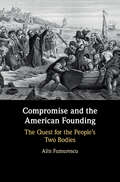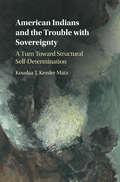- Table View
- List View
Commerce and Peace in the Enlightenment
by Isaac Nakhimovsky Richard Whatmore Béla KapossyFor many Enlightenment thinkers, discerning the relationship between commerce and peace was the central issue of modern politics. The logic of commerce seemed to require European states and empires to learn how to behave in more peaceful, self-limiting ways. However, as the fate of nations came to depend on the flux of markets, it became difficult to see how their race for prosperity could ever be fully disentangled from their struggle for power. On the contrary, it became easy to see how this entanglement could produce catastrophic results. This volume showcases the variety and the depth of approaches to economic rivalry and the rise of public finance that characterized Enlightenment discussions of international politics. It presents a fundamental reassessment of these debates about 'perpetual peace' and their legacy in the history of political thought.
LGBTI Rights in Turkey, Part 1: Sexuality and the State in the Middle East
by Fait MuediniThe LGBTI community in Turkey face real dangers. In 2015, the Turkish police interrupted the LGBTI Pride march in Istanbul, using tear gas and rubber bullets against the marchers. This marked the first attempt by the authorities to stop the parade by force, and similar actions occurred the following year. Here, Fait Muedini examines these levels of discrimination in Turkey, as well as exploring how activists are working to improve human rights for LGBTI individuals living in this hostile environment. Muedini bases his analysis on interviews taken with a number of NGO leaders and activists of leading LGBTI organisations in the region, including Lambda Istanbul, Kaos GL, Pembe Hayat, Social Policies, Gender Identity and Sexual Orientation Studies Association (SPoD), and Families of LGBT's in Istanbul (LİSTAG). The original information provided by these interviews illuminate the challenges facing the LGBTI community, and the brave actions taken by activists in their attempts to challenge the state and secure sexual equality.
The Moral Economy of Elections in Africa: Democracy, Voting and Virtue
by Gabrielle Lynch Nic Cheeseman Justin WillisDo elections turn people into democratic citizens? Elections have long been seen as a way to foster democracy, development and security in Africa, with many hoping that the secret ballot would transform states. Adopting a new approach that focusses on the moral economy of elections, Nic Cheeseman, Gabrielle Lynch and Justin Willis show how elections are shaped by competing visions of what it means to be a good leader, bureaucrat or citizen. Using a mixed-methods study of elections in Ghana, Kenya and Uganda, they explore moral claims made by officials, politicians, civil society, international observers and voters themselves. This radical new lens reveals that elections are the site of intense moral contestation, which helps to explain why there is such vigourous participation in processes that often seem flawed. Demonstrating the impact of these debates on six decades of electoral practice, they explain why the behaviour of those involved so frequently transgresses national law and international norms, as well as the ways in which such transgressions are evaluated and critiqued – so that despite the purported significance of 'vote-buying', the candidates that spend the most do not always win.
Decolonizing Human Rights
by Abdullahi Ahmed An-NaimIn his extensive body of work, Professor Abdullahi Ahmed An-Naim challenges both historical interpretations of Islamic Sharia and neo-colonial understanding of human rights. To advance the rationale of scholarship for social change, An-Naim proposes advancing the universality of human rights through internal discourse within Islamic and African societies and cross-cultural dialogue among human cultures. This book proposes a transformation from human rights organized around a state determined practice to one that is focused on a people-centric approach that empowers individuals to decide how human rights will be understood and integrated into their communities. Decolonizing Human Rights aims to illustrate the decisive role of human agency on the subject of change, without implying that Islamic or any other society are exceptionally disposed to politically motivated violence and consequent profound political instability.
Contagion and War: Lessons from the First World War
by John A. VasquezJohn A. Vasquez explains the processes that cause the spread of interstate war by looking at how contagion worked to bring countries into the First World War. Analysing all the key states that declared war, the book is comprised of three parts. Part I lays out six models of contagion: alliances, contiguity, territorial rivalry, opportunity, 'brute force', economic dependence. Part II then analyses in detail the decision making of every state that entered the war from Austria-Hungary in 1914 to the United States and Greece in 1917. Part III has two chapters - the first considers the neutral countries, and the second concludes the book with an overarching theoretical analysis, including major lessons of the war and new hypotheses about contagion. This book will be of great interest to students and scholars of international relations, conflict studies and international history, especially those interested in the spread of conflict, or the First World War.
Votes from Seats: Logical Models of Electoral Systems
by Shugart Matthew S. Rein TaageperaTake the number of seats in a representative assembly and the number of seats in districts through which this assembly is elected. From just these two numbers, the authors of Votes from Seats show that it is possible to deduce the number of parties in the assembly and in the electorate, as well as the size of the largest party. Inside parties, the vote distributions of individual candidates likewise follow predictable patterns. Four laws of party seats and votes are constructed by logic and tested, using scientific approaches rare in social sciences. Both complex and simple electoral systems are covered, and the book offers a set of 'best practices' for electoral system design. The ability to predict so much from so little, and to apply to countries worldwide, is an advance in the systematic analysis of a core institutional feature found in any democracy, and points the way towards making social sciences more predictive.
Sustainability in the Twenty-First Century: Applying Sustainomics to Implement the Sustainable Development Goals
by Mohan MunasingheIn applying the innovative 'sustainomics' framework and identifying the balanced inclusive green growth (BIGG) path to achieve sustainability, this book provides a rigorous and practical analysis of sustainable development today. Developed and applied globally over the past twenty-five years by world renowned multi-disciplinary expert Mohan Munasinghe, sustainomics gives us an optimistic message: although our problems are serious, we can respond effectively by making development more sustainable, but only if we begin immediately. Sustainomics shows us the first practical steps in making the transition from the risky business-as-usual scenario to a safe and sustainable future for all. Some key features include: an explanation of the key principles of sustainomics, free of technical jargon; empirical case studies that are practical and policy-relevant over a wide range of time scales, countries, sectors, ecosystems and circumstances; annexes that provide mathematical and additional details; and an extensive and up-to-date bibliography to aid further research.
Cambridge Studies in International Relations 144: Hierarchies in World Politics (Cambridge Studies in International Relations #144)
by Ayşe ZarakolGlobalizing processes are gathering increased attention for complicating the nature of political boundaries, authority and sovereignty. Recent examples of global financial and political turmoil have also created a sense of unease about the durability of the modern international order and the ability of our existing theoretical frameworks to explain system dynamics. In light of the inadequacies of traditional international relation (IR) theories in explaining the contemporary global context, a growing range of scholars have been seeking to make sense of world politics through an analytical focus on hierarchies instead. Until now, the explanatory potential of such research agendas and their implications for the discipline went unrecognized, partly due to the fragmented nature of the IR field. To address this gap, this ground-breaking book brings leading IR scholars together in a conversation on hierarchy and thus moves the discipline in a direction better equipped to deal with the challenges of the twenty-first century.
State Formations: Global Histories and Cultures of Statehood
by Greg Anderson John L. Brooke Julia C. StraussFeaturing a sweeping array of essays from scholars of state formation and development, this book presents an overview of approaches to studying the history of the state. Focusing on the question of state formation, this volume takes a particular look at the beginnings, structures, and constant reforming of state power. Not only do the contributors draw upon both modernist and postmodernist theoretical perspectives, they also address the topic from a global standpoint, examining states from all areas of the world. In their diverse and thorough exploration of state building, the authors cross the theoretical, geographic, and chronological boundaries that traditionally shape this field in order to rethink the customary macro and micro approaches to the study of state building and make the case for global histories of both pre-modern and modern state formations.
The Historical Roots of Corruption: Mass Education, Economic Inequality, and State Capacity
by Eric M. UslanerWhy does corruption persist over long periods of time? Why is it so difficult to eliminate? Suggesting that corruption is deeply rooted in the underlying social and historical political structures of a country, Uslaner observes that there is a powerful statistical relationship between levels of mass education in 1870 and corruption levels in 2010 across 78 countries. He argues that an early introduction of universal education is shown to be linked to levels of economic equality and to efforts to increase state capacity. Societies with more equal education gave citizens more opportunities and power for opposing corruption, whilst the need for increased state capacity was a strong motivation for the introduction of universal education in many countries. Evidence for this argument is presented from statistical models, case studies from Northern and Southern Europe, Asia, Africa, Latin America, the United States, Canada, Australia, and New Zealand, as well as a discussions of how some countries escaped the 'trap' of corruption.
Between Fragmentation and Democracy: The Role of National and International Courts
by Eyal Benvenisti George W. DownsBetween Fragmentation and Democracy explores the phenomenon of the fragmentation of international law and global governance following the proliferation of international institutions with overlapping jurisdictions and ambiguous boundaries. The authors argue that this problem has the potential to sabotage the evolution of a more democratic and egalitarian system and identify the structural reasons for the failure of global institutions to protect the interests of politically weaker constituencies. This book offers a comprehensive understanding of how new global sources of democratic deficits increasingly deprive individuals and collectives of the capacity to protect their interests and shape their opportunities. It also considers the role of the courts in mitigating the effects of globalization and the struggle to define and redefine institutions and entitlements. This book is an important resource for scholars of international law and international politics, as well as for public lawyers, political scientists, and those interested in judicial reform.
Bureaucratizing Islam: Morocco and the War on Terror
by Wainscott Ann MarieHow have states in the Middle East and North Africa responded to the War on Terror? While much scholarship has focused on terrorism in the region, there is need for critical studies of Middle Eastern states' counter-terrorism policies. This book addresses that need by investigating Morocco's unique approach to counter-terrorism: the bureaucratization of religion. Morocco's strategy is unique in the degree to which it relies on reforms that seek to make the country's religious institutions into tools for rewarding loyalty and discouraging dissent from religious elites. Through these measures they have limited opposition through an enduring form of institutional control, accommodating some of the country's most virulent critics. This book will be of great use to researchers and scholars of Middle Eastern politics, and it will also appeal to those policymakers interested in security studies and counter-terrorism policies.
Badges and Incidents: A Transdisciplinary History of the Right to Education in America (Cambridge Studies on Civil Rights and Civil Liberties)
by Michael J. KaufmanIn Badges and Incidents, Michael J. Kaufman undertakes an interdisciplinary investigation of American education law and pedagogy. By weaving together the invaluable insights of law, education, history, political science, economics, psychology, and neuroscience, this book illuminates the ways in which the design of the American educational system does not reflect how human beings live and learn. It examines the principles of the nation's Founders and demonstrates how a distorted presentation of the Founders' views curtailed the development of a truly democratic educational system. The influence of this distortion on several critical Supreme Court decisions is exposed, and these decisions have largely failed to facilitate the educational system the Founders envisioned. By placing contemporary challenges in context and endorsing social constructivist pedagogy as the best path forward, Kaufman's study will prove invaluable to advocates of equity in education, helping them navigate a contentious political climate with an eye toward future reform efforts.
Building the Bloc: Intraparty Organization in the US Congress
by Rubin Ruth BlochTraversing more than a century of American history, this book advances a new theory of congressional organization to explain why and how party dissidents rely on institutions of their own making, arguing that these intraparty organizations can radically shift the balance of power between party leaders and rank-and-file members. Intraparty organizations empower legislators of varying ideological stripes to achieve collective and coordinated action by providing selective incentives to cooperative members, transforming public-good policies into excludable accomplishments, and helping members to institute rules and procedures to promote group decision making. Drawing on rich archival evidence and interview data, the book details the challenges dissident lawmakers encounter when they face off against party leaders and their efforts to organize in response. Eight case studies complicate our understanding of landmark fights over rules reform, early twentieth-century economic struggles, mid-century battles over civil rights legislation, and contemporary debates over national health care and fiscal policy.
The Seeley Lectures: Democracy before Liberalism in Theory and Practice (The Seeley Lectures)
by Josiah OberWhat did democracy mean before liberalism? What are the consequences for our lives today? Combining history with political theory, this book restores the core meaning of democracy as collective and limited self-government by citizens. That, rather than majority tyranny, is what democracy meant in ancient Athens, before liberalism. Participatory self-government is the basis of political practice in 'Demopolis', a hypothetical modern state powerfully imagined by award-winning historian and political scientist Josiah Ober. Demopolis' residents aim to establish a secure, prosperous, and non-tyrannical community, where citizens govern as a collective, both directly and through representatives, and willingly assume the costs of self-government because doing so benefits them, both as a group and individually. Basic democracy, as exemplified in real Athens and imagined Demopolis, can provide a stable foundation for a liberal state. It also offers a possible way forward for religious societies seeking a realistic alternative to autocracy.
Candidates and Voters: Ideology, Valence, and Representation in U.S Elections
by Stone Walter J.Candidates and Voters extends our understanding of voting, elections, and representation by elaborating a simple theory of voting choice based on voters' interest in policy and in the suitability of candidates to hold elective office ('leadership valence'). Voters' choices must be understood in the context of the choices between opposing candidates they are offered on these two dimensions. Drawing on extensive analysis of US House races, Stone shows that although voters lack the information that many analysts assume they need to function in a democracy, they are most often able to choose the better candidate on the policy and valence dimensions. In addition, candidates, when they decide whether and how to run, anticipate the interests that drive voters. The book shows that elections tend to produce outcomes on policy and leadership valence consistent with voters' interests, and challenges skeptical views of how well the electoral process works.
Fragmented Democracy: Medicaid, Federalism, and Unequal Politics
by Jamila MichenerMedicaid is the single largest public health insurer in the United States, covering upward of 70 million Americans. Crucially, Medicaid is also an intergovernmental program that yokes poverty to federalism: the federal government determines its broad contours, while states have tremendous discretion over how it is designed and implemented. Where some locales are generous and openhanded, others are tightfisted and punitive. In Fragmented Democracy, Jamila Michener demonstrates the consequences of such disparities for democratic citizenship. Unpacking how federalism transforms Medicaid beneficiaries’ interpretations of government and structures their participation in politics, this book examines American democracy from the vantage point(s) of those who are living in or near poverty, (disproportionately) black or Latino, and reliant on a federated government for vital resources.
Max Weber and International Relations
by Lebow Richard NedMax Weber explored the political, epistemological and ethical problems of modernity, and understood how closely connected they were. His efforts are imaginative, sophisticated, even inspiring, but also flawed. Weber's epistemological successes and failures highlight unresolvable tensions that are just as pronounced today and from which we have much to learn. This edited collection of essays offers novel readings of Weber's politics, approach to knowledge, rationality, counterfactuals, ideal types, power, bureaucracy, the state, history, and the non-Western world. The conclusions look at how some of his prominent successors have addressed or finessed the tensions of the epistemological between subjective values and subjective knowledge; the sociological between social rationalization and irrational myths; the personal among conflicting values; the political between the kinds of leaders democracies select and the national tasks that should be performed; and the tragic between human conscience and worldly affairs.
The BRICS-Lawyers’ Guide to Global Cooperation
by Denis Neuwirth Rostam J. Alexandr Svetlicinii De Castro HalisIn the international trade and development arena, new and developing economies have created a block that is known as BRICS - Brazil, Russia, India, China and South Africa. Initially conceived to drive global change through economic growth, the financial crisis and reversal of fortunes of the BRICS nations have raised questions about their ability to have an impact on the governance of global affairs. This book explores the role of law in various areas of BRICS cooperation including: trade, investment, competition, intellectual property, energy, consumer protection, financial services, space exploration and legal education. It not only covers the specifics of each of the BRICS nations in the selected areas, but also offers innovative and forward-looking perspectives on the BRICS cooperation and their contribution to the reform of the global governance networks. This is a unique reference book suitable for academics, government officials, legal practitioners, business executives, researchers and students.
The Mexican Revolution’s Wake: The Making of a Political System, 1920–1929 (Cambridge Latin American Studies #108)
by Sarah OstenThroughout the 1920s Mexico was rocked by attempted coups, assassinations, and popular revolts. Yet by the mid-1930s, the country boasted one of the most stable and durable political systems in Latin America. In the first book on party formation conducted at the regional level after the Mexican Revolution, Sarah Osten examines processes of political and social change that eventually gave rise to the Institutional Revolutionary Party (PRI), which dominated Mexico's politics for the rest of the twentieth century. In analyzing the history of socialist parties in the southeastern states of Campeche, Chiapas, Tabasco, and Yucatán, Osten demonstrates that these 'laboratories of revolution' constituted a highly influential testing ground for new political traditions and institutional structures. The Mexican Revolution's Wake shows how the southeastern socialists provided a blueprint for a new kind of party that struck calculated balances between the objectives of elite and popular forces, and between centralized authority and local autonomy. Includes a four-state comparison of socialist parties in Southeast Mexico, which contributes a truly regional perspective to a field dominated by locally-specific histories. Addresses the origins of Mexico's idiosyncratic post-revolutionary political system, and facilitates comparisons with histories of state-formation elsewhere in the world. Highlights the political histories of less-studied states in Mexico, and offers background on relevant figures and events, complicating and enriching previous interpretations of this history with new data.
Firms as Political Entities: Saving Democracy through Economic Bicameralism
by Isabelle Ferreras Mouillot Miranda RichmondWhen people go to work, they cease to be citizens. At their desks they are transformed into employees, subordinate to the hierarchy of the workplace. The degree of their sense of voicelessness may vary from employer to employer, but it is real and growing, inflamed by populist propaganda that ridicules democracy as weak and ineffective amid global capitalism. At the same time, corporations continue untouched and even unremarked as a major source of the problem. Relying on 'economic bicameralism' to consider firms as political entities, this book sheds new light on the institutions of industrial relations that have marked the twentieth century, and argues that it is time to recognize that firms are a peculiar institution that must be properly organized in order to unshackle workers' motivation and creativity, and begin nurturing democracy again.
The Broken Ladder: The Paradox and Potential of India's One-Billion
by Anirudh KrishnaDespite becoming a global economic force, why does India win so few Olympic medals and have so many people living in poverty? Why have opportunities not become available more broadly? How can growing individuals assist with the task of building a growing economy? Krishna presents a refreshingly unusual perspective of emergent realities, drawing on the stories of everyday lives, of people like you and me and those less privileged. Through decades-long investigations, living in villages and slum communities, the author presents eye-opening details of missed opportunities and immense untapped talent that can be harnessed, with tremendous consequences for equity and growth. Offering possible solutions for inequality and those in need, The Broken Ladder is a comprehensive and fascinating account of development strategies in a fast-growing, yet largely agrarian, developing economy.
The Political Economy of the Small Welfare State in South Korea
by Yang Jae-JinThis book explains why the Korean welfare state is underdeveloped despite successful industrialization, democratization, a militant labor movement, and a centralized meritocracy. Unlike most social science books on Korea, which tend to focus on its developmental state and past years' rapid economic development, this book deals with social welfare issues and politics during the critical junctures in Korea's history: industrialization in the 1960-70s, the democratization and labor movement in the mid-1980s, globalization and the financial crisis in the 1990s and the 'wind of free welfare' in the 2010s. It highlights the self-interested activities of Korea's militant enterprise unionism at variance with those of a more solidaristic industrial unionism in the European welfare states. Korean big business, the chaebol, accommodated the unions' call for higher wages and more corporate welfare, which removed practical incentives for unions to demand social welfare. Korea's single-member-district electoral rules also induce politicians to sell geographically targeted, narrow benefits rather than public welfare for all.
Compromise and the American Founding: The Quest for the People's Two Bodies
by Alin FumurescuWhy is today's political life so polarized? This book analyzes the ways in which the divergent apprehensions of both 'compromise' and the 'people' in seventeenth-century England and France became intertwined once again during the American founding, sometimes with bloody results. Looking at key-moments of the founding, from the first Puritan colonies to the beginning of the Civil War, this book offers answers of contemporary relevance. It argues that Americans unknowingly combined two understandings of the people: the early modern idea of a collection of individuals ruled by a majority of wills and the classic understanding of a corporation hierarchically structured and ruled by reason for the common good. Americans were then able to implement the paradigm of the 'people's two bodies'. Whenever the dialectic between the two has been broken, the results had have a major impact on American politics. Born by accident, this American peculiarity has proven to be a long-lasting one.
American Indians and the Trouble with Sovereignty: A Turn Toward Structural Self-Determination
by Kessler-Mata Kouslaa T.With tribes and individual Indians increasingly participating in American electoral politics, this study examines the ways in which tribes work together with state and local governments to overcome significant governance challenges. Much scholarship on tribal governance continues to rely on a concept of tribal sovereignty that does not allow for or help structure this type of governance activity. The resulting tension which emerges in both theory and practice from American Indian intergovernmental affairs is illuminated here and the limits of existing theory are confronted. Kessler-Mata presents an argument for tribal sovereignty to be normatively understood and pragmatically pursued through efforts aimed at interdependence, not autonomy. By turning toward theories of federalism and freedom in the republican tradition, the author provides an alternative framework for thinking about the goals and aspirations of tribal self-determination.
